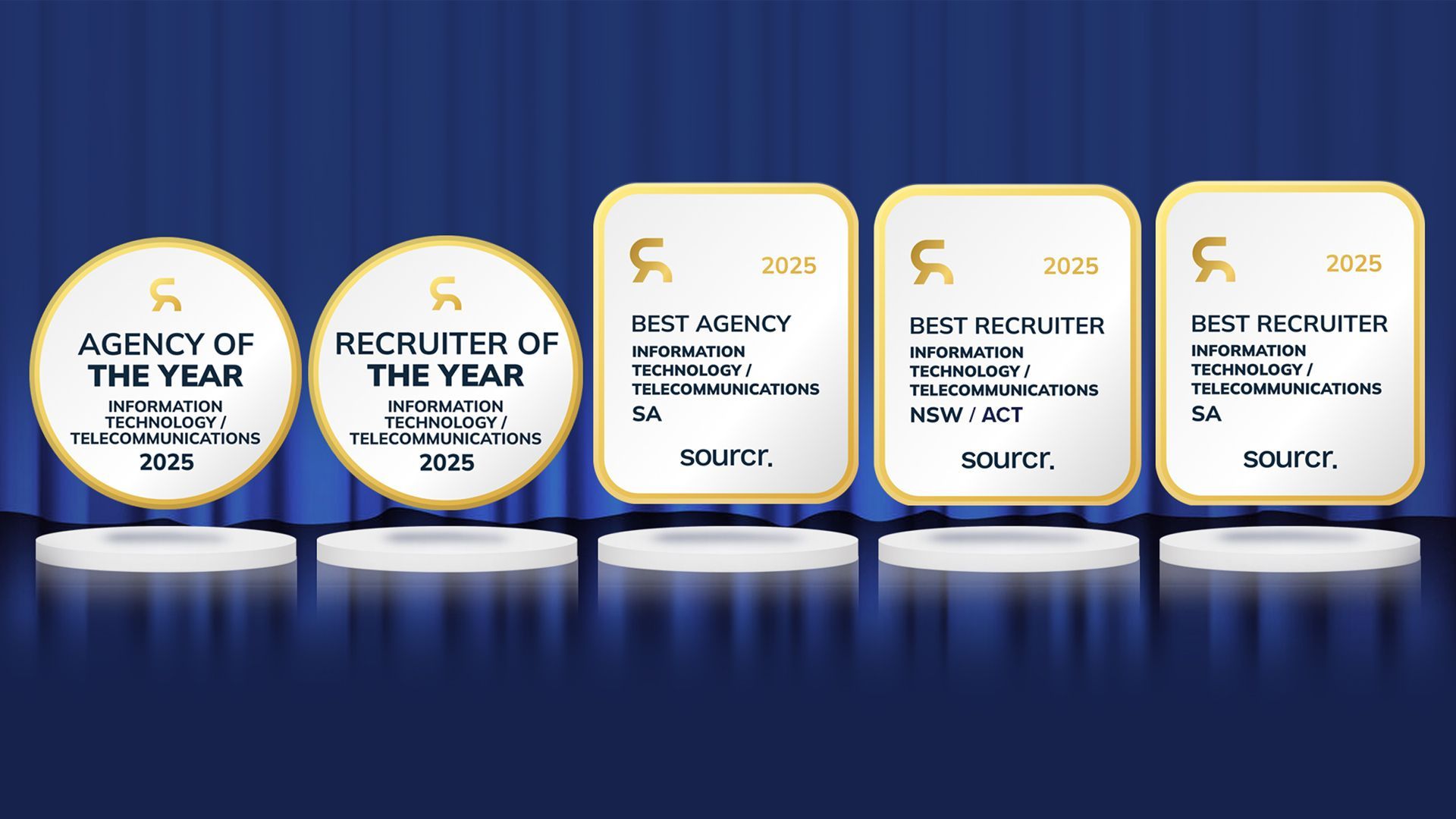What Are Tech Salaries Like in 2025? (Statistics & Trends)
The tech market in Australia has changed significantly over the last 5 years. With more businesses investing in digital and a growing demand for skilled professionals, there’s never been a better time to be in IT. But with so many opportunities, it can be tough to know what you’re truly worth. We recently published our FY24/25 IT Salary Guide, which breaks down all of Australia’s current tech salary data. In this article, we summarise the key highlights from our market research and insider data.
Highest-Paying IT Roles in Australia
Let’s get straight into the most asked question when it comes to salaries- ‘What tech job pays the most?’ According to the Emanate Technology salary guide, these are the roles currently commanding top dollar (all salaries exclude super):
| Job Title | Low | High | Specialism |
|---|---|---|---|
| Cloud Solutions Architect | $160K | $220K | Cloud & DevOps |
| Agile Coach | $150K | $235K | Project Services |
| Solution Architect | $140K | $240K | Infrastructure & Support / Software Development |
| Principal Engineer | $130K | $240K | Software Development |
| Information Technology Security Advisor (ITSA) | $180K | $250K | Cyber Security |
| Chief Information Security Officer (CISO) | - | $250K+ | Cyber Security |
| Delivery Manager | $130K | $250K | Project Services |
| Enterprise Architect | $150K | $255K | Software Development |
| Program Manager | $160K | $260K | Project Services |
| Engineering (GM, VP, Director) | $160K – $200K | $330K – $385K | Software Development |
Cloud Solutions Architect ($160K – $220K)
A Cloud Solutions Architect designs and implements cloud-based solutions for businesses. They bridge the gap between technical possibilities and business needs, ensuring that cloud strategies align with organisational goals. Key responsibilities include designing scalable and secure cloud architectures, evaluating and selecting appropriate cloud technologies, and overseeing the implementation and migration of systems to the cloud.
Agile Coach ($150K – $235K)
An Agile Coach helps tech teams implement and optimise Agile methodologies. They provide training and coaching on Agile frameworks like Scrum and Kanban, facilitate meetings and workshops, and guide teams in adopting Agile practices such as daily stand-ups, sprint planning, and retrospectives. They also work with organisations to improve their Agile processes and ensure effective collaboration across departments.
Solution Architect ($140K – $240K)
A Solution Architect designs and oversees the implementation of technology solutions that meet business needs. They have a broad understanding of their specialisation, allowing them to create integrated solutions that are scalable, reliable, and cost-effective. Key responsibilities include analysing business requirements, designing technical architectures, evaluating and selecting appropriate technologies, and collaborating with development teams to ensure successful implementation.
Principal Engineer ($130K – $240K)
A Principal Engineer plays a critical role in guiding and mentoring software development teams. They possess deep technical knowledge and experience, enabling them to provide architectural guidance, solve complex technical challenges, and ensure the quality and performance of software products. Key responsibilities include leading technical design reviews, establishing coding standards and best practices, and collaborating with other engineers to deliver high-quality software solutions.
Information Technology Security Advisor (ITSA) ($180K – $250K)
An Information Technology Security Advisor facilitates the protection of organisations’ sensitive data and systems from cyber threats. They assess vulnerabilities, implement security measures, and develop incident response plans to mitigate risks. Key responsibilities include conducting security audits, providing cybersecurity awareness training, and staying up-to-date on the latest cyber threats and vulnerabilities to advise on appropriate security controls.
Chief Information Security Officer (CISO) ($250K+)
A Chief Information Security Officer (CISO) is responsible for establishing and maintaining the vision, strategy, and program to ensure information assets and technologies are adequately protected. The CISO directs staff in identifying, developing, implementing, and maintaining processes across the enterprise to reduce information and information technology (IT) risks. They respond to incidents, establish appropriate standards and controls, manage security technologies, and direct the establishment and implementation of policies and procedures.
Delivery Manager ($130K – $250K)
A Delivery Manager spearheads project execution, ensuring that technology initiatives are delivered on time, within budget, and to the required standards. They coordinate resources, manage risks, and keep stakeholders informed every step of the way. Key responsibilities include leading project teams, tracking progress, and ensuring successful project completion that meets business objectives.
Enterprise Architect ($150K – $255K)
An Enterprise Architect manages a company’s entire technology system, ensuring that all the software systems and applications work together harmoniously. They’re big-picture thinkers, aligning technology strategies with business goals and creating a roadmap for future development. Key responsibilities include designing and implementing software architecture frameworks, evaluating new technologies, and ensuring that software solutions are scalable, secure, and aligned with overall business objectives.
Program Manager ($160K – $260K)
An IT Program Manager oversees a portfolio of IT projects, ensuring they align with an organisation’s strategic objectives. They manage interdependencies between projects, allocate resources effectively, and mitigate risks to ensure successful delivery. Key responsibilities include defining program scope, managing budgets, tracking progress, and communicating with stakeholders to ensure projects are completed on time and within budget.
Engineering (GM, VP, Director) ($160K – $385K)
An Engineering GM, VP, or Director in software development leads and oversees the engineering department, driving technical strategy and innovation. They are responsible for managing engineering teams, establishing a culture of excellence, and ensuring the successful delivery of software products. Key responsibilities include setting technical direction, overseeing resource allocation, managing budgets, and collaborating with other departments to align engineering efforts with business objectives.
It’s clear that specialised roles and leadership positions are where the real money is at in 2025. These high-demand roles often require unique, niche skills and experience, leading to a competitive salary landscape.
Location, Location, Location: Salary Variations Across Australia
Is there a difference in salary between locations? The Emanate Technology salary guide revealed significant salary variations across different cities and states.
Adelaide & Brisbane
Adelaide and Brisbane, while experiencing growth in their technology sectors, generally have the lowest salary ranges among the five cities in the salary guide. For instance, a Cloud Engineer in Adelaide and Brisbane earns between $120K and $160K per year, compared to $140K to $180K in Sydney. This difference is likely due to a lower cost of living, less competition for talent, and a smaller concentration of major technology companies. However, both cities offer attractive lifestyles and emerging opportunities for tech professionals.
Canberra
As Australia’s capital city, Canberra boasts a stable economy and a significant presence of government agencies and technology companies. Salaries in
Canberra often fall between those offered in Sydney and Melbourne and those in Adelaide and Brisbane. A Project Manager in Canberra can expect to earn between $140K and $180K per year, an example of the city’s demand for skilled tech professionals.
Sydney
As the financial and technological hub of Australia, Sydney consistently commands the highest salaries across the board. For example, a Software Engineering Manager in Sydney can expect to earn between $220K and $275K per year, significantly higher than their counterparts in other cities. This premium is likely attributed to the high concentration of major companies, intense competition for talent, and a higher cost of living.
Melbourne
Melbourne, a cultural hub with a thriving startup scene, generally offers the second-highest salaries in the country. That’s not to say that Melbourne doesn’t compete with Sydney. For example, the average salary for a Data Scientist in Melbourne ranges from $145K to $190K, which is higher than Sydney’s average, reflecting the city’s strong focus on data analytics and innovation. So, while salaries in Melbourne are generally slightly lower than in Sydney, they remain competitive and attractive to skilled professionals.
If you’re open to relocating, it’s worth considering which cities offer the most competitive salaries for your skillset. For example, the guide shows that while Sydney might offer slightly higher salaries overall, the lower cost of living in Brisbane could make it a more attractive option for some.
Experience Matters
While it’s not uncommon knowledge, it’s important to note that experience plays a significant role in determining remuneration potential. Here are some examples of roles and salaries across different experience levels.
Junior/Entry-Level
- Web Developer: $75K – $100K
- ICT Operations Support: $55K – $60K
- SOC Analyst: $60K – $80K
- Cloud Admin: $90K – $100K
At entry level, the focus is on building foundational skills and gaining practical experience. Salaries are lower, but there’s significant room for growth with increased experience and skill development.
Mid-Level
- Full-Stack Developer: $130K – $180K
- Project Manager: $135K – $170K
- Infrastructure Engineer: $130K – $140K
- UI/UX Designer: $130K – $140K
Mid-level professionals typically have a deeper understanding of their specialisation and can handle more complex tasks with greater autonomy. This translates to higher earning potential and increased responsibility.
Senior/Lead
- Chief Information Security Officer (CISO): $250K+
- Principal Engineer: $210K – $240K
- Engineering GM: $350K – $385K
- Tech Lead: $200K – $240K
Senior and lead roles often involve leadership responsibilities, strategic decision-making, and mentoring junior staff. These positions command the highest salaries due to the wealth of experience and expertise required.
So, whether you’re just starting your career or have a decade under your belt, it’s important to keep gaining valuable experience and building expertise, as our salary research indicates that each year of experience can lead to a significant salary bump, especially in those early years.
Where To Next?
For a detailed breakdown of salaries and contract rates in the Australian tech market, you can download our free 2025 Salary and Rate Guide here.
If you want to connect with a tech recruiter to discuss potential opportunities, don’t hesitate to reach out to our team. Or browse our current opportunities here.






